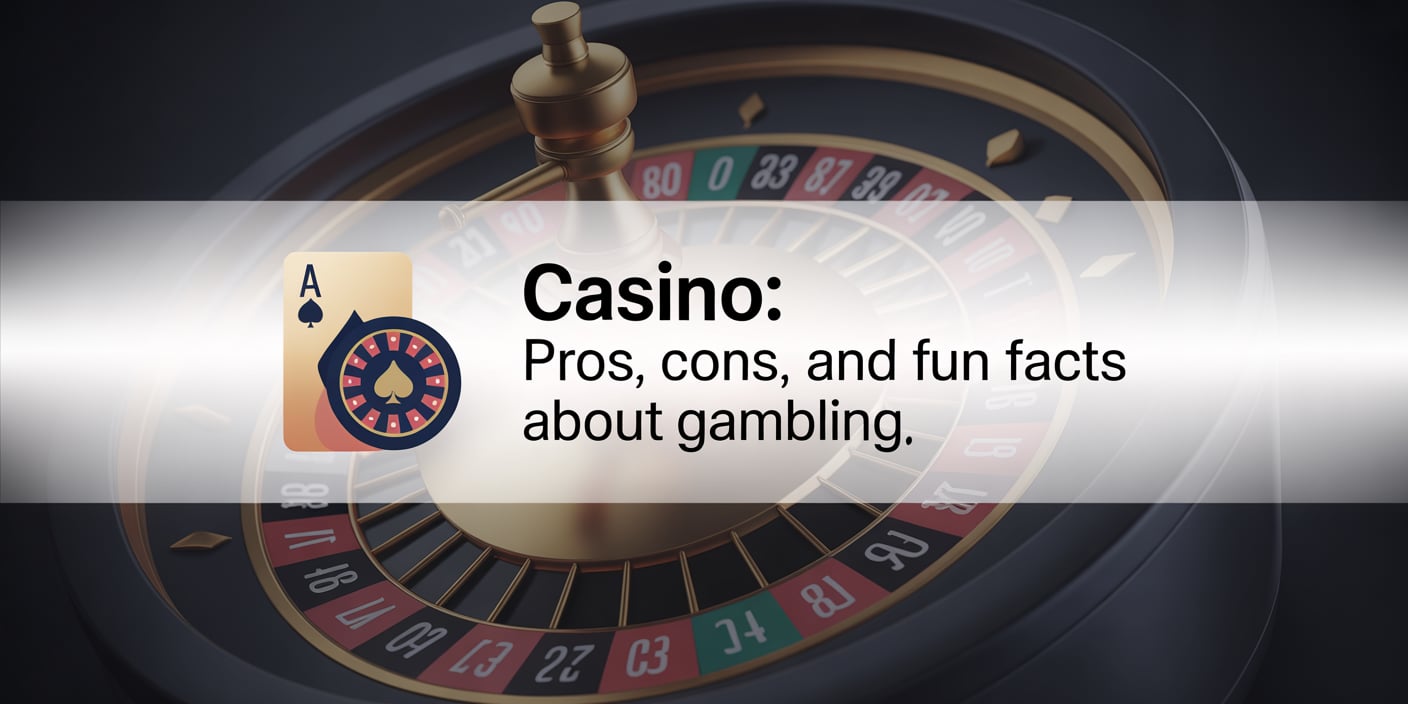Casino: Pros, Cons, and Fun Facts About Gambling

The only way to win at roulette is to take the money when the croupier isn't looking. That's how Albert Einstein finished his study on ways to come out ahead in the roulette game.
Today, it's widely acknowledged that gambling should be seen as a form of entertainment, not a way to make money. The house always wins—literally! And yet, every year more people choose to test their luck at casinos, driven by emotions, personal experiences, or curiosity about tools like the betnow app features that enhance the modern gambling experience.
Understanding the allure of online and land-based casinos for so many people requires exploring the links between gambling and psychology.
The Pros and Cons of Casino Gambling
Advantages:
-
Gambling can be a source of stress for both winners and losers. But that stress might be good for your health—at least as far as the everyday challenges you face are concerned. The wins and losses you accumulate when betting can help you develop better coping skills. At least, that's what researchers at the University of Alberta concluded after observing the behavior of several subjects over a period of months. They found that after being subjected to the "randomness" of gambling, people were better able to cope with the similar sorts of stresses that life throws our way. And it's not apparent why this should be.
-
Comparatively with drugs and alcohol, gambling has very minimal consequences on physical health. Still, its allure as a potential money-maker causes it to impinge significantly on folks' lives, just as the younger Jonny could have used a $20 loan to make it to a concert. Like drugs and alcohol, gambling releases dopamine in the brain. And enthusiasts seldom discuss the pain, shame, and sense of failure that accompany compulsive gambling. Since this book's main audience is teachers and those who work with youth, we'll shine a light on that dark side.
-
Game forms such as poker stimulate positively the part of the brain that is vulnerable to Alzheimer's, which in turn may help stave off the affliction.
-
Games that are based on skill can train your capacity for estimating probabilities. This is a very useful ability in many real-life situations.
Disadvantages:
-
Inadequate control of gambling can bring about brain malfunctions, such as the ones that have already been stated regarding dopamine. They pertain especially to the faulty pathway of dopamine release and reuptake in situations of excessive and compulsive gambling. This pathway affects the partial release of dopamine during pleasurable experiences outside of gambling, like if you're at a concert or a party. Those fun events seem gray and lifeless compared to the colorful thrill of betting.
-
Winning can seed addiction, and one win can do so as thoroughly as ten losses. It is not a surprise, then, that casinos try to keep you winning. They want to keep you addicted.
-
Investing more time and money in gambling makes the dependency much stronger.
Gambling and the Illusion of Control
The control illusion is a lovely little mind trick that most of us use to feel better about our lives and the world around us. It makes us think we can affect outcomes when what we are really affecting is our interpretation of what has happened.
This notion, which exists to some degree in all of us, becomes very potent in gambling venues. It is a major reason why people keep coming back to try their luck—sometimes with catastrophic results.
People typically wager larger amounts when they believe they have the ability to influence the outcome. Two primary factors that enhance this incorrect notion are winning by a slim margin and the act of choosing.
Near Wins
Frequent in gambling, near wins are the close calls that just miss the jackpot. They can be almost winning just about any kind of game of chance, like being one number short in a lottery, having a horse come in second in a race, or a roulette ball landing right next to your number. These well-known "near-miss" experiences give gamblers a false sense of actually winning and encourage them to play on as if they are actually improving.
Personal Choice
The tone of the rephrased text is kept the same to ensure that the original meaning is preserved. When individuals participate in games of chance where they can have a more dynamic role—such as by picking numbers for the lottery, casting the dice, or spinning the roulette wheel themselves—they often have the mistaken belief that they are somehow directing the result toward a favorable outcome. This is what the gambling industry counts on.
Fun Facts About Gambling
Some fascinating psychological phenomena influence gamblers' behavior.
-
Good Mood Research indicates that having a positive mood boosts an individual's inclination to engage in risky behaviors.
-
Gambler’s Fallacy The conviction that following a streak of seven black numbers, a red number is "due" to show up next—despite the fact that the probabilities are still 50/50.
-
Betting Bias: In a study on horse racing, bettors were asked to estimate their horse’s chances of winning before and after placing a bet. They assessed their horse's chances to be much better than before after they had placed bets.
-
Superstitions and Systems When it comes to gambling, people engage in all sorts of nonsensical behaviors that they believe affect the outcome of the game. They might think they're doing something that will give them an edge when in fact, they're just being superstitious. For example, they might think a slot machine is "due" to pay off, when in fact it has the same odds of paying off today as it did a week ago. Or they might think that some number is lucky and that using it will improve their odds when the outcome is completely random.
Men vs. Women in Gambling
Men and women are both equally drawn to gambling—almost, that is, equally drawn; nearly half the gambling public, 50 percent, is female. Women, however, are less attracted to the kinds of games that tend to pull men in; roughly 50 percent of the gambling revenue that's generated in this country is generated by women. But when you look at the types of games that women play, women generally tend to play games that they can more easily walk away from.
-
Betting on sports is something a man will tend to do.
-
More often than not, women indulge in online bingo, preferring this digital pastime over any other type of online gambling. But it's not the only gambling game women want to play. After bingo, our research shows, women play another virtual form of gambling: sports betting. While way more men place bets on sporting events, women are throwing their hats in the ring, too. After sports betting, another game women make time for is the kind that gets them slots excited.
The most recent scientific research has shown that women are, on average, more risk-averse than men—but that doesn't always translate into the gaming world. In fact, some studies suggest that if women are winning, they might be just as likely as men to take risks with their winnings.
The factor of age is present as well. On average, women begin wagering at approximately 35 years of age, about 15 years later than men.
Women like slot machines. They play them all, but some of them make it up to the level of art. Men are mad for the burgeoning world of video gaming, and as for skill-based games—they're more into them, or at least we think they are, with no bump in psych findings to suggest otherwise. But our society still seems to imagine that casino floors are male spaces. That's a problem.
